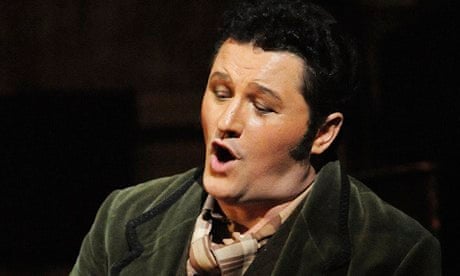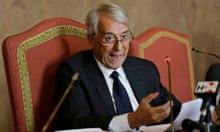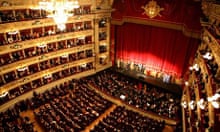It was the 7 December gala season opener at La Scala: one of the most glamorous dates in Europe's cultural calendar which every year, on the feast day of the city's patron saint, brings a host of Italy's biggest names to Milan for a night at the opera. This year, as a fitting conclusion to bicentennial celebrations of his birth, Giuseppe Verdi's La Traviata was put on at the world-famous theatre for the first time in years.
But, as is often the case in the turbulent world of Italian opera, the real drama began when the curtain fell.
As the production came to a close on Saturday evening, some of the audience, reportedly the strict traditionalists in the uppermost balcony known as the loggionisti, booed during parts of the curtain call in protest over what they saw as a bastardised contemporary reworking of a beloved cultural classic.
Furious, the Polish tenor who plays the role of Alfredo, the lovestruck young hero, took to Facebook later that night to declare that it would be his "last production" at La Scala. "I think They should engage only Italian singers," wrote Piotr Beczala. "Why I spend my time for this 'shmarrn' [nonsense] … Arrivederci …"
On Sunday, amid speculation that Beczala's comments could see him walk out of the production for good, he added another statement, saying he would honour his contract with La Scala but thereafter would come to Italy "only for vacations".
He then appeared to take a sideswipe at Russian director Dmitri Tcherniakov, whose innovative and unusual operatic productions have been met with raised eyebrows more than once. Beczala said he had shown his professionalism by agreeing to conform to the director's "vision" of his character even though he himself did not agree with it.
"I played it as good as I could," he wrote, in English. "The result of my work was … my first ever buuuuh…[sic]."
Responding to the outburst, La Scala's outgoing general manager, Stéphane Lissner, told the Italian media he stood by Beczala "100%", describing him as "one of the few great tenors of our time".
The booing, he was quoted as saying, was yet another sign of how a "fanatical" minority in the opera house's audience was actively putting off great talents.
From the cheap seats in the upper reaches of the theatre, the loggionisti – diehard defenders of La Scala and operatic etiquette – have for years made their feelings about performances felt loud and clear. In 2006, the tenor Roberto Alagna staged an infamous mid-performance walk-out after being whistled and booed during Aida, later claiming he had been at physical risk from the bellicose audience.
According to an Associated Press reporter present on Saturday, the jeers from the upper reaches were countered by a sustained, 11 minute-long wave of applause from below, and Diana Damrau, the German soprano playing Violetta, was bombarded with roses.
But the critics were divided over the production's merits. In a review in Corriere della Sera on Monday, opera specialist Paolo Isotta said it was "one of the worst [productions of La Traviata] that I can recall", criticising not only the director but also the conductor, Daniele Gatti, and much of the cast.
Also unimpressed was Franco Zeffirelli, the Italian film and opera director, who said that elements of the contemporary production's third act were "simply ridiculous". "Watching how this poor Violetta ended up the other night, I died a little bit too," the 90-year-old was quoted as saying.
No stranger to controversy, Tcherniakov showed no sign of being cowed by the criticism. His 2006 staging of Tchaikovsky's Eugene Onegin – whose first two acts were set in pre-revolutionary Russia only for the third to take place in 1950s western Europe – had the traditionalists up in arms when it opened at the Bolshoi theatre in Moscow. His present-day Don Giovanni caused similar controversy in Aix-en-Provence in 2010.
"I can only say that I tried to bring out the themes of the opera that are normally neglected," he told La Repubblica on Monday. He added: "I do not expect that my productions will be liked by all the audience. Discord is normal in theatre."


